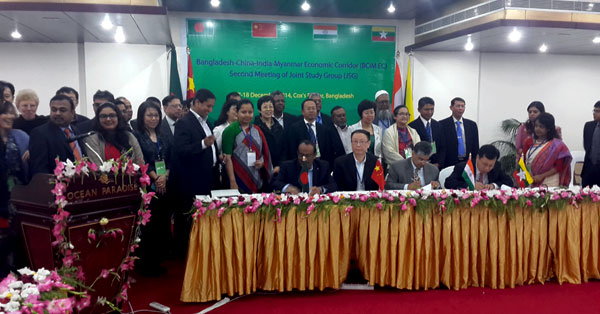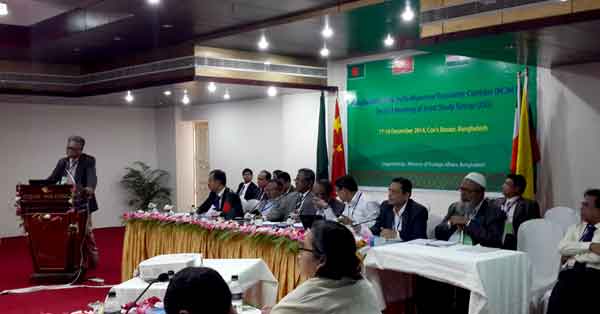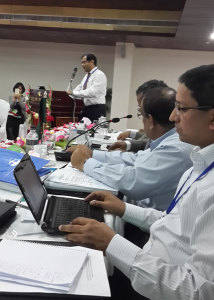Professor Mustafizur Rahman, Executive Director, CPD and Ambassador Munshi Faiz Ahmad, Chairman, Bangladesh Institute of International Strategies and Studies (BIISS) have spearheaded the national study on BCIM Economic Corridor (BCIM EC). Dr Khondaker Golam Moazzem, Addditional Research Director, CPD has conducted the study which was earlier presented in a review seminar.



Published in The Observer on Thursday, 18 December 2014
BCIM Meet Begins
Cooperation on investment, energy, connectivity reviewed
Saleem Samad with Farhad Iqbal from Coxs Bazar
A two day meet of the Bangladesh-China-India-Myanmar Economic Cooperation (BCIM-EC) began at the beach town Cox’s Bazar on Wednesday.
The BICM “joint study group” meeting, organised by host Bangladesh, was inaugurated by Foreign Secretary Shahidul Haque on Wednesday morning at Hotel Ocean Paradise.
The second round of discussions on “BCIM corridor”, a modern day silk-route among Bangladesh, India, China and Myanmar is expected to discuss the scope and modalities of cooperation in sectors of goods and services, investment, energy, multimodal connectivity and sustainable development, a Foreign Office official said.
Experts on the first day have presented their national studies from four countries outlining perspectives and expectations of each country on the objectives, scope and modalities of cooperation.
Prof Mustafizur Rahman, executive director of Centre for Policy Dialogue (CPD), presented a study paper on the Bangladesh part of BCIM.
The CPD and the Bangladesh Institute of International and Strategic Studies (BIISS) have jointly conducted a feasibility study for the Bangladesh section.
Bangladeshi experts opined that the 2,800 km Kolkata-Kunming route, connecting Ruili-Bhamo, Lashio, Mandalay, Tamu, Imphal, Sylhet and Dhaka is the best option.
However, at Chinese city of Kunming on December 18, 2013, the four nations agreed that the silk-corridor should run from Kunming to Kolkata, linking Mandalay in Myanmar as well as Cox’s Bazar, Chittagong and Dhaka in Bangladesh.
Published in The Observer on Wednesday, 17 December 2014.
Silk-Route High On Agenda
BCIM-EC meet begins at C’Bazar today
Diplomatic Correspondent
The second round of discussions on BCIM corridor, which is said to be a silk-route between Bangladesh, India, China and Myanmar, will begin today (Wednesday) at the sea-beach town of Cox’s Bazar.
The two-day meeting of the Bangladesh-China-India-Myanmar Economic Cooperation (BCIM-EC) will discuss the scope and modalities of cooperation in sectors of goods and services, investment, energy, multimodal connectivity and sustainable development, said an officer at the Ministry of Foreign Affairs (MoFA).
Studies outlining perspectives and expectations of each country on the objectives, scope and modalities of cooperation will be presented at the meeting.
The BICM “joint study group” meeting, organised by host Bangladesh, will be chaired by Foreign Secretary Shahidul Haque, the officer confirmed.
Cooperation in a number of agreed sectors such as trade in goods and services, investment and financing, trade facilitations, energy, multimodal connectivity, sustainable development, human resource development, poverty alleviation, people to people connectivity will be in the agenda.
The meeting would also discuss various aspects of institutional structure of the BCIM-EC.
Prof. Mustafizur Rahman, Executive Director of the Centre for Policy Dialogue (CPD), has conducted a study on the Bangladesh part of BCIM. It will be presented there.
The CPD and the Bangladesh Institute of International and Strategic Studies (BIISS) have conducted feasibility studies for the Bangladesh part.
The 2,800-km Kolkata-Kunming route, connecting Ruili-Bhamo, Lashio, Mandalay, Tamu, Imphal, Sylhet and Dhaka is the best option, according to a Bangladeshi concept paper.
The policy paper presented at an inter-ministerial meeting at Prime Minister’s Office on February 6 reads: “The corridor is expected to unlock parts of the four countries towards reaping greater economic synergies, complementarities and upscale manifold economic opportunities.” The silk-corridors in Bangladesh, China, India and Myanmar have immense trade potentiality of fetching $132 billion, according to a study by Research and Information System for Developing Countries in India.
The roads, railways, airlines, water routes, telecom networks and energy pipelines along the Kolkata-Kunming route is expected to form a thriving economic belt, according to relevant experts.
The Economic Corridor also known as BCIM Corridor is to connect the cities of Kolkata to Kunming. Its cooperation framework envisages connecting some of the ports and key nodes, cities and growth centres of the four countries through improving and developing key economic infrastructure and facilitate greater movement of people, culture, goods, services, investment and finance.
In the process, the Economic Corridor is expected to unlock parts of the four countries towards reaping greater economic synergies, complementarities and upscale manifold economic opportunities as various investment projects and initiatives roll out.
However, in the south-western Chinese city of Kunming, the provincial capital of Yunnan on December 18, 2013, the four nations agreed that the corridor would run from Kunming to Kolkata, linking Mandalay in Myanmar as well as Dhaka and Chittagong in Bangladesh.
The BCIM process took off in 1998 at Track II level. In 2013, the high political leadership of the four countries agreed to elevate the BCIM process to an inter-governmental level.
Published in Kaler Kantho on Wednesday, 17 December 2014.
যৌথ সমীক্ষা গ্রুপের বৈঠক আজ শুরু
নিজস্ব প্রতিবেদক
বাংলাদেশ, চীন, ভারত ও মিয়ানমারের (বিসিআইএম) মধ্যে অর্থনৈতিক করিডর নির্মাণে সাতটি খাত চিহ্নিত করে সে বিষয়ে গবেষণা শেষ করেছে যৌথ সমীক্ষা গ্রুপ। খাতগুলো হলো যোগাযোগ, বিনিয়োগ, জ্বালানি, দারিদ্র্য, পরিবেশ, বাণিজ্য ও মানুষে মানুষে সরাসরি সম্পর্ক বাড়ানো। অর্থনৈতিক সহযোগিতা ও যোগাযোগ বাড়াতে করণীয় নির্ধারণে গত বছর ডিসেম্বরে চারটি দেশ আলাদাভাবে যৌথ সমীক্ষা গ্রুপ গঠন করেছিল। সেখানে সংশ্লিষ্ট দেশগুলোর গবেষণা সংস্থা, বিশেষজ্ঞ, গবেষক ও সরকারি কর্মকর্তাদের সদস্য করা হয়েছিল। গত এক বছর নিজেদের চাহিদার আলোকে সাতটি খাত নিয়ে গবেষণা শেষ করে প্রতিবেদন তৈরি করেছেন গ্রুপের সদস্যরা। সেই প্রতিবেদন নিয়ে আজ বুধবার পর্যটন নগরী কক্সবাজারে শুরু হচ্ছে যৌথ সমীক্ষা গ্রুপের দ্বিতীয় বৈঠক। দুই দিনের এই বৈঠক আয়োজন করেছে বাংলাদেশ সরকার। এতে সভাপতিত্ব করবেন পররাষ্ট্র সচিব মো. শহীদুল হক। এর আগে গত বছর ১৮ ডিসেম্বর চীনের কুনমিংয়ে এই সমীক্ষা গ্রুপের প্রথম বৈঠক হয়েছিল।
পররাষ্ট্র মন্ত্রণালয়ের কর্মকর্তারা জানিয়েছেন, চার দেশের মধ্যে অর্থনৈতিক করিডর নির্মাণে যৌথ সমীক্ষা গ্রুপ যেসব খাত চিহ্নিত করেছে, সেগুলো বাস্তবায়নে সুনির্দিষ্ট কী কী প্রকল্প হাতে নেওয়া যায় সে বিষয়ে আলোচনা হবে বৈঠকে। একই সঙ্গে এই করিডর বাস্তবায়নে কী পরিমাণ বিনিয়োগ প্রয়োজন হবে, সে বিষয়েও আলোচনা ছাড়াও আঞ্চলিক যোগাযোগ বাড়াতে বিদ্যমান সড়কগুলোর আধুনিকায়ন এবং নতুন সড়ক নির্মাণের জন্যও প্রকল্প বাছাই করা হবে।
গবেষণার সঙ্গে জড়িত সেন্টার ফর পলিসি ডায়ালগের (সিপিডি) নির্বাহী পরিচালক মোস্তাফিজুর রহমান কালের কণ্ঠকে বলেন, গত বছর ডিসেম্বরে গঠিত যৌথ সমীক্ষা গ্রুপ এক বছর ধরে সাতটি খাতে গবেষণা করে প্রতিবেদন তৈরি করেছে। এসব খাতে বিদ্যমান সমস্যা ও করণীয় নিয়েও সুপারিশ রয়েছে প্রতিবেদনে। দুই দিনব্যাপী ওই বৈঠকে এই প্রতিবেদন নিয়ে আলোচনা হওয়ার কথা রয়েছে। মোস্তাফিজুর রহমান বলেন, অর্থনৈতিক করিডর বাস্তবায়নে প্রচুর বিনিয়োগ দরকার। যোগাযোগব্যবস্থা নিয়ে গবেষণা করেছেন সিপিডির অতিরিক্ত গবেষণা পরিচালক খন্দকার গোলাম মোয়াজ্জেম, পরিবেশ নিয়ে ব্র্যাক বিশ্ববিদ্যালয়ের সাবেক উপাচার্য ড. আইনুন নিশাত ও বিনিয়োগ নিয়ে বিআইডিএস।
পররাষ্ট্র মন্ত্রণালয়ের কর্মকর্তারা জানিয়েছেন, বিসিআইএম অর্থনৈতিক করিডর নির্মাণের প্রক্রিয়া শুরু হয় ১৯৯৮ সালে। এতে চীন সরকারের আগ্রহ সবচেয়ে বেশি। কিন্তু রাজনৈতিক টানাপড়েনসহ নানা কারণে গত দেড় দশকে করিডর নির্মাণের কর্মপরিকল্পনা নির্ধারণে তেমন অগ্রগতি হয়নি। তবে গত বছর ১৮ ডিসেম্বর চার দেশ বিসিআইএম প্রক্রিয়াকে আন্তসরকার প্রক্রিয়ায় উন্নীত করার সিদ্ধান্ত নেয়। সেখানেই যৌথ সমীক্ষা গ্রুপ করা হয়। সে গ্রুপের প্রথম বৈঠক চীনের ইউনান প্রদেশের রাজধানী কুনমিংয়ে অনুষ্ঠিত হয়। এর পরের বৈঠকটি গত জুনে ঢাকায় হওয়ার কথা ছিল। পরে তা পিছিয়ে অক্টোবরে নেওয়া হয়। কিন্তু মিয়ানমারের যৌথ সমীক্ষা গ্রুপ গবেষণা প্রতিবেদন চূড়ান্ত করতে না পারায় আরো দুই মাস পিছিয়ে আজ কক্সবাজারে শুরু হচ্ছে সে বৈঠক। তৃতীয় বৈঠক হওয়ার কথা রয়েছে ভারতে। অর্থনৈতিক করিডর কলকাতা, ঢাকা, মিয়ানমার হয়ে চীনের কুনমিংয়ে গিয়ে শেষ হবে। এর আওতায় চার দেশের বন্দর, শহর, উৎপাদন কেন্দ্রগুলোর মধ্যে সংযোগ সৃষ্টি হবে।


